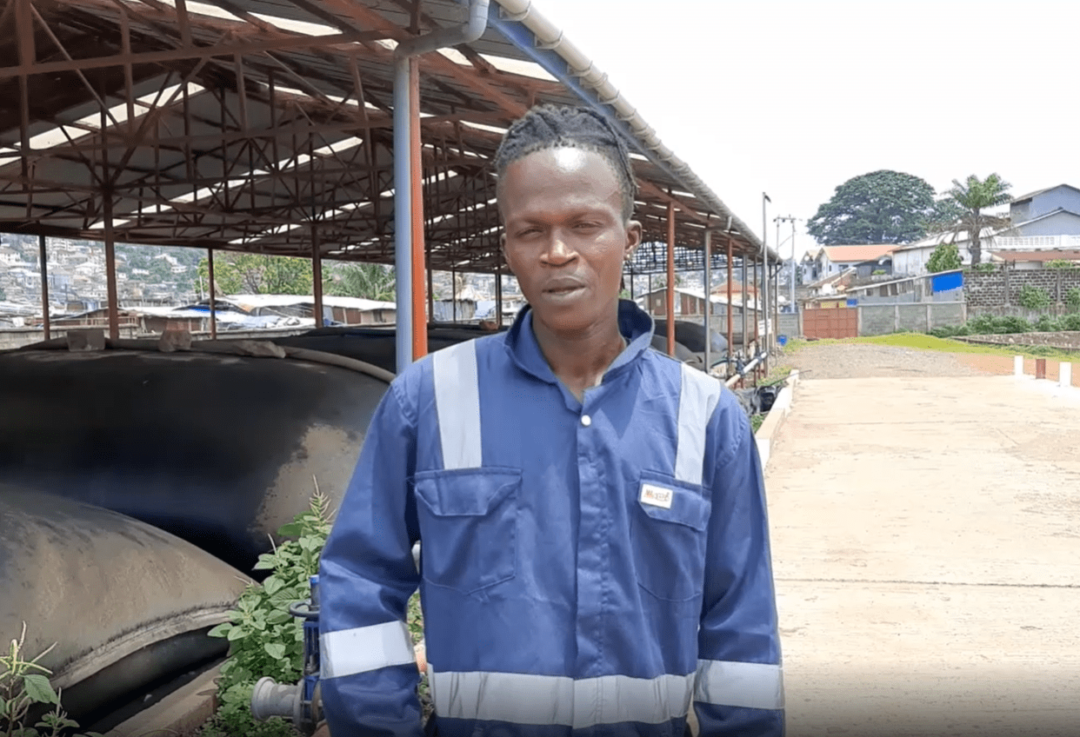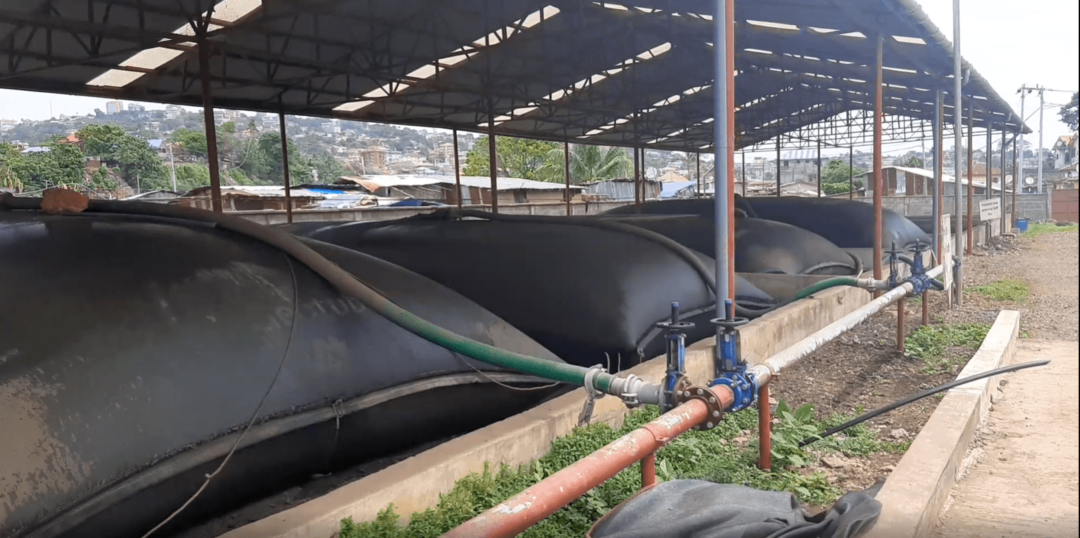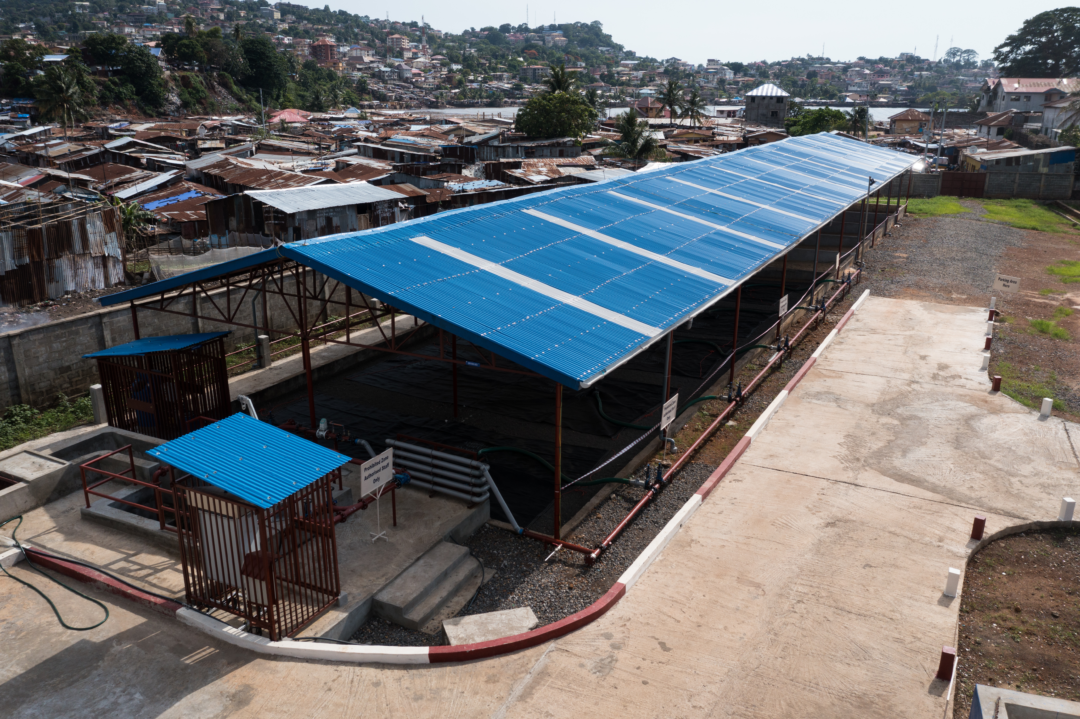 Stories
Stories
October 11, 2022 • 3 min read
Sierra Leone’s capital, Freetown, has been growing rapidly in recent years , with population growth outstretching public services. Sanitation in particular has been an issue in the city, with informal and inadequate management of liquid and solid waste leading to increased risks of disease and pollution.
Momodu Conteh, a community member in the suburb of Kingtom and worker at a new liquid waste management plant constructed by GOAL, is grateful for the new facility. It has reduced outbreaks of disease and has brought economic benefits to the community.
“Before the establishment of this treatment plant, the vacuum truck would openly dislodge waste at the dumpsite in Kingtom. The sludge would find its way into the community and overflow into people’s homes, especially during the rainy season. We had high disease outbreaks from direct exposure to the waste.”

Momodu Conteh, staff member at the Kingtom Faecel Sludge Management Plant in Freetown.
The Waste Management Plant
With support from FCDO and in partnership with Freetown City Council, GOAL completed construction the facility in March 2021. It is the first liquid waste treatment plant in Sierra Leone and utilises innovative Geobag de-watering technology which separates liquid waste from solid waste.
The plant was constructed on a former informal waste dump, where household human waste would be deposited directly into the environment. About 40% of the population in the city, especially those who worked at the dumpsite scavenging through the waste to pick plastics and organic waste, were exposed to various toxic fumes and pollutants.

Geobag de-watering facilities, which separates liquid waste from solid waste.
As of June 2022, the plant had processed 1,500 truckloads of faecal sludge – 15% of Freetown’s liquid waste. Over 11Kt of sludge has been processed so far, saving a vast amount of liquid waste from contaminating the environment and reducing risk hazards for the communities.
Improving Community Health
“The people who constructed this facility are from the local community,” says Momodu. “All the casual workers that are recruited to empty the Geobags are also from this community. Their wage is helping them to take care of their families’ needs.”
Community leader, Chief Pa Alimamy Koroma, also highlights how the community was negatively impacted by the previous way of dealing with waste.
“Community members, especially children would play around and come in contact with the sludge. Mosquitoes also utilised the sludge as a breeding ground. The smell was also bad but now it is under control because of the plant. The treatment plant that GOAL constructed in our community has solved many of our problems,” he said.
Multiple Benefits
Programme Coordinator for GOAL Sierra Leone, Pius Nishimwe says; “Not only has this plant helped in providing a safe place for waste disposal, but we also developed a voucher system for the Vacuum Truck Operators (VTOs) which has increased Freetown City Council’s revenue by 250%. The VTOs are also motivated to bring waste to the newly constructed treatment plant due to improved road access. GOAL constructed a concrete road which reduced VTO’s maintenance costs significantly. This will contribute greatly to developing the plant in a self-sustaining model.”

The Faecal Sludge Management Plant in Kingtom, Freetown.
Pius adds that GOAL is exploring ways of ensuring that the waste management innovations improve resilience and wellbeing of communities.
“With the end-product from the Geobag technology, there is great potential to explore the development of climate smart waste-to-energy options. These can act as alternatives to wood-cooking fuel and compost for agricultural purposes. This which boosts the local market with climate-friendly energy options and reduce dependency on current wood-charcoal produced by unregulated de-forestation”, he says.
While designed to just serve Freetown, the plant’s operations have also expanded, serving neighbouring districts including Portloko, Makeni and Kambia districts, where VTOs are providing collection services. Pius looks forward to seeing how the project can grow.
“There is an opportunity to scale up, share key learnings with other similar contexts or develop a similar plant elsewhere in the region.”
